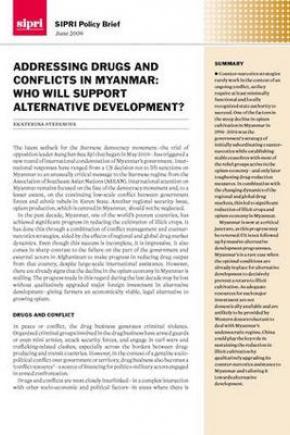Addressing drugs and conflicts in Myanmar: who will support alternative development?
Download this SIPRI Policy Brief
Summary
Counter-narcotics strategies rarely work in the context of an ongoing conflict, as they require at least minimally functional and locally recognized state authority to succeed. One of the factors in the steep decline in opium cultivation in Myanmar in 1996-2006 was the government’s strategy of initially subordinating counter-narcotics while establishing stable ceasefires with most of the rebel groups active in the opium economy—and only later toughening drug-reduction measures. In combination with the changing dynamics of the regional and global drug markets, this led to significant reduction of illicit crops and opium economy in Myanmar.
Myanmar is now at a critical juncture, as this progress may be reversed if it is not followed up by massive alternative development programmes. Myanmar’s is a rare case when the optimal conditions are already in place for alternative development to decisively prevent a return to illicit cultivation. As adequate resources for such major investment are not domestically available and are unlikely to be provided by Western donors reluctant to deal with Myanmar’s undemocratic regime, China could play the key role in sustaining the reduction in illicit cultivation by qualitatively upgrading its counter-narcotics assistance to Myanmar and tailoring it towards alternative development.
About the author
Ekaterina Stepanova (Russia) is the Leader of the SIPRI Armed Conflicts and Conflict Management Programme. She is on leave from the Institute of World Economy and International Relations (IMEMO), Moscow, where she has led a research group on non-traditional security threats since 2001. In 2003 she worked at SIPRI as a Researcher on armed conflict and terrorism. She is the author of Terrorism: Patterns of Internationalization (Sage, 2009, co-editor and co-author), Terrorism in Asymmetrical Conflict: Ideological and Structural Aspects, SIPRI Research Report no. 23 (2008) and Anti-Terrorism and Peace-Building During and After Conflict, SIPRI Policy Paper no. 2 (1993). She serves on the editorial board of Terrorism and Political Violence.

